Harper An imprint of HarperCollinsPublishers 1 London Bridge Street London SE1 9GF
First published in Great Britain in 1984 by Collins Crime
Copyright © Emma Page 1984
Emma Page asserts the moral right to be identified as the author of this work
A catalogue copy of this book is available from the British Library.
This novel is entirely a work of fiction. The names, characters and incidents portrayed in it are the work of the author’s imagination. Any resemblance to actual persons, living or dead, events or localities is entirely coincidental.
All rights reserved under International and Pan-American Copyright Conventions. By payment of the required fees, you have been granted the nonexclusive, nontransferable right to access and read the text of this e-book on-screen. No part of this text may be reproduced, transmitted, downloaded, decompiled, reverse-engineered, or stored in or introduced into any information storage and retrieval system, in any form or by any means, whether electronic or mechanical, now known or hereinafter invented, without the express written permission of HarperCollins e-books.
HarperCollinsPublishers has made every reasonable effort to ensure that any picture content and written content in this ebook has been included or removed in accordance with the contractual and technological constraints in operation at the time of publication.
Source ISBN: 9780008175863
Ebook Edition © MARCH 2016 ISBN: 9780008175870
Version [2016-02-18]
CONTENTS
The wind had veered in the night and blew now soft and warm from the south. In the garden of Manor Cottage, three-quarters of a mile from the village of Littlebourne, the snowdrops were out; fat spears of daffodils were pushing up under the ancient apple trees.
The garden was large and rambling and had stood neglected for some years before the Pictons bought the property eighteen months ago. The garden was enclosed on three sides by an old wall of rose-red brick, mantled with ivy. Here and there a self-sown tree had sprung up in the shelter of the walls and stood now strong and established. The Pictons’ daughter, Emily, their only child, climbed the trees summer and winter, made her dens among the branches, perched up there unseen, watching folk walk by along the road to Littlebourne, or a car going past in the other direction to Cannonbridge, five miles to the south-west.
In the cottage kitchen, cosy from the heat of the old solid-fuel stove, restored now and refurbished, the Pictons were finishing breakfast. All three of them wore Fair Isle jerseys painstakingly hand-knitted by Mrs Picton.
Emily sat opposite her father. She was nine years old, short and sturdily built, with a bright darting eye and a look of lively curiosity. She finished her porridge and began to fold her table napkin.
‘Is that all you’re going to eat?’ Leonard Picton said with reproof.
‘I have to be at school early.’ She assumed an air of importance. ‘I have to give out paper for the geography test.’
Leonard glanced at the clock. ‘You’ve plenty of time. Finish your breakfast properly.’ Emily unfolded her napkin again and cut herself a slice from a densely-textured wholemeal loaf; she spread it with butter and honey.
On a shelf of the dresser a radio recited its morning litany. Leonard gave it half an ear as he ate his coarse porridge of mixed whole grains, filling and sustaining, with an agreeable nutty taste. He was a spare, bony man in his middle forties with sharp features, thin fair hair receding at the temples, long, straggling side-whiskers. He taught history at the College of Further Education in Cannonbridge.
He glanced across at his wife who was standing by the stove, staring out through the window. ‘Any more coffee?’ he asked.
Olive came out of her thoughts. She picked up the jug that was keeping warm on the side of the stove and carried it to the table. She poured the coffee, fragrant and dark, made from a mixture of roasted barley and dandelion roots. Her hands were red and rough, marked and scarred from old scalds and burns, cuts and blisters.
She was a plain woman, a few years younger than her husband. Her figure was thin and angular. She wore no make-up and her hair, a nondescript brown already tinged with grey, was drawn severely back into a scanty bun.
She
